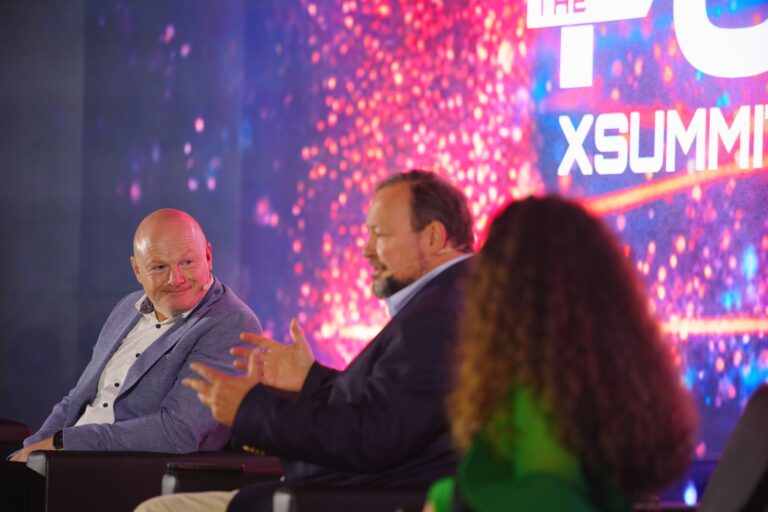At the recent Futurists X Summit in Dubai, Ken Moore, Chief Innovation Officer at Mastercard, shared his insights on the technological forces reshaping global commerce. The summit served as a platform for Moore to reflect on the future and Mastercard’s role in shaping it.
“Stepping onto the stage at the Futurists X Summit gave me the opportunity to address something I think about every day: what can technology make possible tomorrow, that’s not possible today?” Moore said. “I shared Mastercard’s approach to innovation, which embraces a move fast mentality while also prioritizing trust and security at the core.”
Moore believes the decade ahead will be defined by fundamental shifts in how commerce works – driven by rapid advances in AI, digital infrastructure, and consumer expectations. Among the trends Mastercard is tracking, agentic commerce stands out as a particularly transformative force.
“Agentic commerce is emerging as a foundational shift,” Moore explained. “AI-powered agents are beginning to act on behalf of consumers, executing tasks, making purchases, and managing services autonomously. This re-architecture of digital commerce will move us from interface-driven experiences to intent-driven outcomes. Consumers will delegate tasks to trusted agents, and brands will need to become machine-legible, ready to transact invisibly and intelligently.”

Alongside this shift, Moore pointed to the increasing urgency of building a globally interoperable payment ecosystem. “Today’s payment ecosystem is fragmented, with different rails and standards creating friction. By 2030, orchestration layers and shared protocols will enable seamless, real-time transactions across borders, platforms, and currencies. This will unlock new efficiencies and expand access to underserved markets.”
Moore also highlighted the evolution of digital identity as a pillar of the future digital economy. “Advances in biometrics, tokenization, and AI-powered security are enabling frictionless authentication across services, from healthcare to travel. By the end of the decade, consumers will expect a single identity to unlock personalized, secure experiences everywhere.”
Trust and ethics, he stressed, will be essential to maintaining consumer confidence in this future. “Consumers are demanding transparency, ethical sourcing, and secure data practices. Commerce platforms must embed these values into their infrastructure to remain competitive.”
The role of a Chief Innovation Officer, Moore said, has evolved in step with the pace of technological change. It’s no longer limited to generating new ideas – it’s about connecting emerging tech to strategic business outcomes, and ensuring innovation is scaled responsibly throughout the organization.
“The role of a Chief Innovation Officer today is both expansive and deeply strategic. It’s not just about ideation or R&D – it’s about orchestrating innovation across the entire enterprise, aligning emerging technologies with business outcomes, and ensuring that innovation is not a siloed function but a shared capability,” he said.
“At Mastercard, I lead an interdisciplinary team inclusive of product managers, researchers, experience designers, data scientists, and developers to explore customer behavior, market trends, and emerging technologies. Our mission is to shape the future of commerce by delivering differentiated products, services, and experiences that create real value.”
Moore acknowledged that the demands of innovation leadership have changed significantly. “What’s changed most in recent years is the pace and scope of technology adoption. Innovation is as much about long-term bets as it is about rapid iteration, responsible deployment, and scalable impact. We’re not just forecasting trends, we’re building agentic systems, AI-powered personalization, and interoperable payment frameworks that are already reshaping how consumers and businesses interact.”
His role now extends beyond product development into governance, market readiness, and external partnerships. “My remit has evolved to include not just product incubation but also governance, commercialization, and ecosystem engagement. That means working closely with our partners, regulators, and customers to ensure that innovation is inclusive, secure, and trusted. It also means anticipating shifts in consumer expectations – like the move toward invisible commerce or the rise of digital identity – and helping our teams design for what’s next.”
Internally, Moore has focused on making innovation a shared responsibility within Mastercard. “We support our employees through training, competitions, and cross-functional guilds that encourage collaboration and creative problem-solving. Innovation is everyone’s job, and our goal is to make it accessible, actionable, and aligned with our purpose.”
Ultimately, Moore sees the Chief Innovation Officer as someone who brings everything together. “One of the most important elements of the Chief Innovation Officer role today is that of a connector, bridging technology and strategy, internal teams and external ecosystems, today’s challenges and tomorrow’s possibilities.”
Delving deeper into agentic commerce, Moore explained how it radically changes the way consumers interact with brands. “The agentic shift is not just a technological evolution – it’s a fundamental re-architecture of digital commerce. Historically, consumers have interacted with brands through interfaces, manually navigating product discovery, comparison, and purchase. Agentic systems invert that model. AI-powered agents now act on behalf of consumers, anticipating needs, making decisions, and executing transactions with minimal human input.”
“This transformation reshapes the customer journey into an intelligent, autonomous flow. Instead of browsing and clicking, consumers delegate intent. Agents – trained on preferences, context, and consent, handle everything from sourcing products to selecting payment methods. The result is a frictionless experience where commerce becomes invisible, yet deeply personalized.”
This poses new challenges and opportunities for businesses. “For brands and platforms, this shift demands a new kind of readiness. Traditional commerce systems must evolve from being user-facing destinations to becoming machine-legible environments, places where agents can transact securely and confidently. This means rethinking everything from API accessibility to trust protocols.”
Mastercard is already acting on this vision. “Just this month, we announced a suite of tools and collaborations designed to power smarter, safer agentic commerce. These include the Agent Toolkit for developers, Insight Tokens for secure personalization, and Agentic Consulting Services to help businesses design intelligent shopping experiences. We’re also working with partners like Stripe, Google, and Antom to make agentic transactions scalable across the global ecosystem. By the holiday season, all U.S. Mastercard cardholders will be enabled for our Agent Pay program, with global rollout to follow shortly thereafter.”
Moore also highlighted Mastercard’s growing investment in the Middle East as a hub for AI and innovation. “The Middle East, and the UAE in particular, is a hub for AI Innovation. Mastercard has launched the Center for Advanced AI and Cyber Technology in Dubai in collaboration with the UAE’s Artificial Intelligence, Digital Economy and Remote Work Applications Office. The project seeks to enhance AI capabilities and readiness across the region.”
For Moore, the future of commerce lies in intelligent automation rooted in human values. “Ultimately, agentic commerce is about empowering consumers with intelligent delegation – giving them control through consent, and convenience through automation. At Mastercard, we’re committed to ensuring this transformation is built on trust, transparency, and interoperability.








